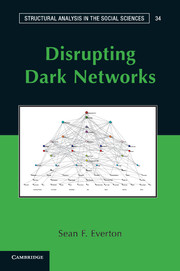Book contents
- Frontmatter
- Contents
- Figures
- Tables
- Preface
- Acknowledgments
- Part I Introduction
- Part II Social Network Analysis: Techniques
- Part III Social Network Analysis: Metrics
- Part IV Social Network Analysis: Advances
- Part V Conclusion
- Appendix 1 The Noordin Top Terrorist Network
- Appendix 2 Glossary of Terms
- Appendix 3 Multidimensional Scaling with UCINET
- Appendix 4 The Just War Tradition
- References
- Index
Appendix 4 - The Just War Tradition
Published online by Cambridge University Press: 05 April 2013
- Frontmatter
- Contents
- Figures
- Tables
- Preface
- Acknowledgments
- Part I Introduction
- Part II Social Network Analysis: Techniques
- Part III Social Network Analysis: Metrics
- Part IV Social Network Analysis: Advances
- Part V Conclusion
- Appendix 1 The Noordin Top Terrorist Network
- Appendix 2 Glossary of Terms
- Appendix 3 Multidimensional Scaling with UCINET
- Appendix 4 The Just War Tradition
- References
- Index
Summary
No single authoritative list of just war criteria exists, and although the following list is “my own,” it has been derived and adapted from Allman and Winright (2010), Cole (2002), Walzer (2006), and Yoder (1996).
Jus ad bellum (Justice in Deciding to Go to War)
Just Cause. This criterion holds that a war may be fought for a justifiable, defensible, and morally necessary cause. To be just, the offense must be actual and verifiable, intentional, and of substantial importance, and it cannot be provoked (i.e., a queen or president can't goad someone into committing an offense so that they can then declare war). Offenses can include aggressive behavior necessitating defense, a threat demanding deterrence, or an injustice demanding reparation (e.g., the Holocaust). It can be committed against a third nation, an ally, or innocent subjects on whose behalf a legitimate authority intervenes. Just war theorists disagree about when intervention on behalf of an oppressed population is legitimate. Walzer (2004, 2006: 67–81) believes that the presumption must be against intervention but acknowledges there are times when the evil being committed is so great (e.g., the Holocaust) that intervention is necessary.
Legitimate Authority. This criterion asserts that only legitimate authorities may wage war. Examples include individuals who rule through “dynastic dissent” (e.g., kings, queens) and democratically elected officials. An exception to this general rule is officials who have gained their authority through legitimate means but are “bad” rulers (e.g., tyrants); they forfeit their claim to legitimacy. Examples of illegitimate authorities include private citizens who wage wars (e.g., militia groups), bandits and privateers, and those who rebel against one's own sovereign. An exception to this is that rebellion is permitted when sovereigns lose their claim to legitimacy because they are tyrants.
...
- Type
- Chapter
- Information
- Disrupting Dark Networks , pp. 417 - 420Publisher: Cambridge University PressPrint publication year: 2012



